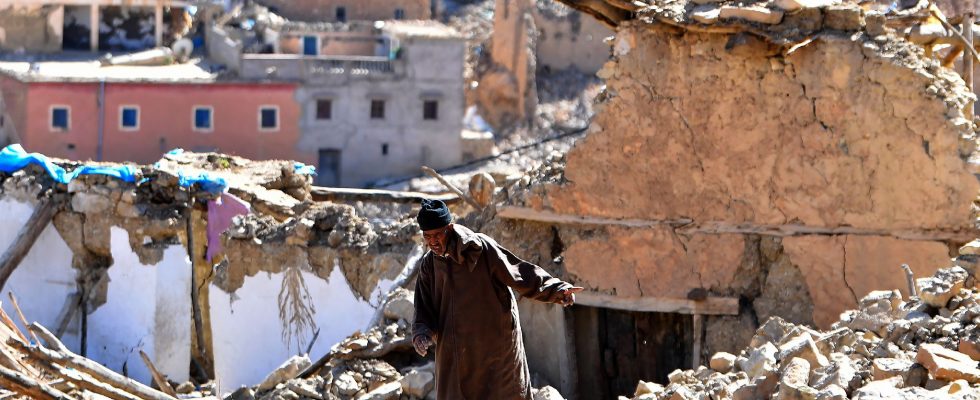Unlike the floods that hit Libya, the earthquake that killed nearly 3,000 people in Morocco is one of those disasters that humanity cannot predict. Earthquakes form the archetype of the tragedy which befalls humanity and which seems to reveal its powerlessness in the face of the forces of nature. From there to overwhelming a supernatural power, there is a step that the human spirit is tempted to take. “The Moroccan people express the seriousness of the tragedy by invoking the anger of God,” writes the philosopher Ali Benmakhlouf in the columns of Philosophy magazine. This providential reading of natural disasters is the one that has long prevailed in the history of humanity.
In Europe, this faded from the 18th century, as evidenced by the quarrels which followed the Lisbon earthquake in 1755. The third largest port in Europe is also the capital of a very Catholic country. The old controversy over the meaning of the misfortunes that nature inflicts on the human race is starting again. To the disciples of Leibniz’s theodicy who see in this catastrophe a divine omen, Voltaire responds with a famous poem which is indignant at the sermons which claim that every tragedy has its reasons for being. No, definitely, Nature is not this benefactor that we should revere without reservation. An avid reader of Voltaire, Rousseau responded to him with a famous letter faithful to his ideology hostile to modernity. The damage suffered by the people of Lisbon, he assures, is the work of civilization and not of nature.
The inhabitants of Lisbon would have alleviated their sorrows by taking inspiration from the savages in the desert who, because of their way of life, do not expose themselves to the perils of civilized life: “agree, for example, that nature does not had not gathered there twenty thousand houses of six to seven stories, and that, if the inhabitants of this large city had been dispersed more evenly and more lightly housed, the damage would have been much less and perhaps zero […] You would have liked the tremor to have happened in the depths of a desert rather than in Lisbon. Can we doubt that they also form in deserts? But we don’t talk about them, because they do no harm to the gentlemen of the towns, the only men we took into account.”
Beliefs
Wild nature is right while civilization is wrong: such is Rousseau’s feeling which clashes with Moroccan reality. It was the remote villages – and not the large urban centers – which were most affected by the earthquake. It would be wrong to believe that we are immune to the cruelties of nature on the grounds that we would keep ourselves away from the vices of “Civilization”.
Especially since the examination of the countries most vulnerable to earthquakes once again refutes Rousseauist prejudices. In 2010, a magnitude 7 earthquake occurred in Haiti with a terribly deadly toll. More than 250,000 people will die in this disaster. The following year, Japan recorded one of the most violent earthquakes in its history, of magnitude 9. However, it is proven that it was the tsunami – and not the earthquake – which was the cause of the earthquake. the majority of the 18,000 dead and missing. Japan is indeed a pioneer country in the implementation of seismic measures. According to researcher Jean-François Heimburger, more than 80% of homes are covered by this technology. This policy was initiated in the 20th century, notably in response to the Tokyo earthquake of 1923 which caused more than 100,000 deaths.
It goes without saying that the attitude of societies towards natural risks depends on the way in which they are perceived. The economic factor alone cannot explain the delays that certain countries are experiencing in implementing prevention measures. Risk aversion and the desire to reduce it depend on the beliefs that drive each people. Also faced with a major earthquake in his country which left more than 50,000 dead, Turkish President Erdogan preferred to evoke “the hand of destiny” rather than the failures which affect constructions in a country where the seismic risk is particularly high . Where superstition and fatalism govern mentalities, people are less eager to demand from the authorities and industrialists the preventive measures which have proven themselves elsewhere and for a long time. Thus, despite its excesses, Rousseau’s trial has at least one advantage: it questions the share of responsibility of humankind in the misfortunes which overwhelm it. Because if nature conceals many calamities, it has also endowed humanity with the power to domesticate them.
*Ferghane Azihari is general delegate of the Free Academy of Human Sciences (ALSH) and member of the Society of Political Economy (SEP). He is the author of Environmentalists against modernity at Presses de la Cité.
